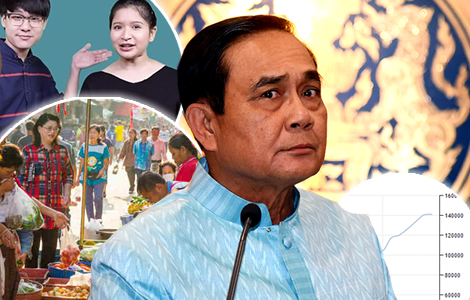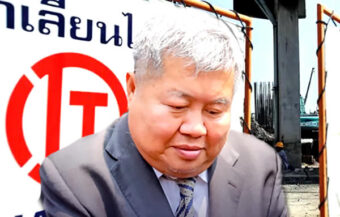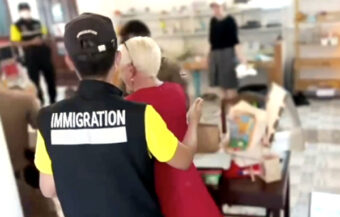The problem is not that the Thai government is trying to ‘spin’ the story but that there are genuinely two different ways of looking at Thailand’s economic performance. This combined with the inequalities in the country between the haves and the have nots, make the Thai economic story a polarised one. A tale of two poles or polls. Take your pick with this story.
The condition of the Thai economy, economic fundamentals and the public’s experience of it is becoming more difficult to decipher as two polls released on Sunday seemed to tell different stories in a week in which the Ministry of Industry warned that misleading information was being peddled in the media in relation to Thailand’s manufacturing industry which it claims has created twice as many jobs as those that have been lost in 2019 due to the global trade war. It also pointed to a 37% rise in investment. It’s not just in industry or manufacturing. There is now also a consistent conflict between reports on Thailand’s tourism industry which according to official accounts is coming to the end of a record year but which many trade experts consider as being in decline or losing out to the regional and international competition. This was also the view of the public according to one of two opinion polls published this Sunday.

Two opinion polls published by leading Thai media outlets on Sunday show clearly that there is a disconnect between two views of the Thai economy and the country’s economic performance that has continued to widen throughout 2019.
The divergence can be traced to February this year when the first signs of export contraction were gleaned and consumer confidence began to fall.
A Suan Dusit poll conducted for the Bangkok Post, Thailand’s leading English speaking newspaper, highlighted that the number one issue of concern among the Thai public right now is the higher cost of living in the kingdom which most people attribute to new government taxes that have been levied on popular and staple items in recent months dressed up as health taxes. A whopping 65.5% identified this as a major issue for them.
Inflation in Thailand is officially quite low
According to the Thai central bank, inflation in Thailand is quite low and was one of the reasons in the recent weeks for allowing the bank to proceed with a second interest rate cut. The appreciating value of the Thai baht, a source of huge concern and pain to Thailand’s businesses in the export sector should be allowing for greater purchasing power abroad for imports but that is not what is happening on the ground according to Sunday’s poll.
The poll had a sample of 1,200 and was conducted from Tuesday the 12th November up until Saturday the 15th.
Public perceive that the economy to be faltering
The second revelation from the poll is the second biggest issue affecting the public’s mind. That is what most people in Thailand see as a slow and lacklustre economic performance by the country’s economy throughout 2019.
The public, according to this survey, feels that the root causes of the situation are a poor performance by the government, what they see as a decline in Thailand’s tourism sector and of course the strong baht. The Thai currency has risen by between 7% to 10% against its competitors and other world currencies during the year causing factory closures, as well as cutbacks in overtime and layoffs.
A second poll from another respected media outlet tells a story of public satisfaction
However, there is another side to this story apparently. A poll published in The Nation news outlet, a respected source, on Sunday paints an opposite, mirror image of the situation.
The poll with a similar sample, conducted by an organisation called Super Poll Research Centre suggested that only 7.3% of the Thai public was unhappy with the current Thai government.
Polls with a similar sample and timespan showed 67% of Thai people happy with the country’s situation
This poll was conducted from November 10th to 15th again with a sample of approximately 1,200.
In the poll, nearly 67% of Thai people said that they were ‘happy’ with the country’s current predicament with just over 26% adopting a neutral stance.
The results of the poll were outlined by Assistant Professor Noppadon Kannika.
Government scored highly for maintaining the strong position of the baht in the Super Poll
A qualitative analysis conducted by Super Poll showed that the current Thai government led by General Prayut Chan ocha achieved positive scores (above 100) for its role in preserving national peace (175.47), the strength of the Thai currency (160.95), the performance of public banks (154.84) and public health (150.92) as well as in education and energy.
The government received a more marginally positive report for its efforts to prime the economy (103.96).
Bank of Thailand attempting to rein in the baht
It is ironic that while the poll showed confidence in the ability of the government to maintain a strong currency, the Bank of Thailand and the Ministry of Finance is actively engaged in efforts to reduce is value.
Indeed a senior government minister told a Bangkok seminar some weeks ago that the baht must be curbed as a key government priority. Industry Minister Suriya Juangroongruangkit said the target value should be ฿32 to $1.
Polls come as weak 3% growth figure predicted for 2019 with caution about prospects for 2020
The two polls come as most economic commentators predict that the Thai economy will grow at somewhere near 3% this year hit by a contraction in exports but supported towards the end of the year by a pick up in public and private investment as well as domestic consumption.
Bank of Thailand – Thai economy not in crisis
The Bank of Thailand while continuously warning about high household debt and threatening further borrowing curbs has at the same time reminded observers that the economy is not in a crisis and that the economic fundamentals are sound.
This is a reference to lower government borrowing compared to international standards and a consistently high current account surplus despite falling exports.
A consistent pattern throughout the year has seen imports drop in line with exports.
The bank is also pinning its hopes on lower interest rates and its recent adjustment of capital outflow rules to effectively rein in the value of the Thai baht in spite of scepticism from some economic thinkers.
Economy praised by rating agencies Moodys and Fitch
The country’s economic situation has been praised by both of the world’s leading rating agencies Moodys and Fitch as well as both the IMF and the World Bank.
Yet consumer confidence has plummeted in Thailand from an index high of 82 in February this year to 70.7 in October as measured by The University of the Thai Chamber of Commerce. The index has consistently dropped as the country’s exports contracted.
Momentous crisis facing Thai farmers
Thailand’s farmers are also facing a momentous crisis with the ban on chemicals used as pesticides predicted to dramatically raise production costs from December 1st in an industry that is already having problems selling its products on international markets because of the appreciating Thai baht and competition from regional players.
Better last quarter in 2019 but fears for 2020
Despite what may be a more promising performance in the last quarter and amid higher tourism numbers for the high season, many observers see plenty of concern on the downside moving into 2020.
Demographics – the underlying economic problem
One key factor, not often discussed is the continuing impact of demographics as Thailand’s older workers opt out of the workforce and the country, year by year, faces all the problems associated with this fundamental and inescapable economic challenge.
Concerns about Thailand’s tourism industry
There are also concerns about Thailand’s tourism sector. The Thai Tourism Authority is still predicting that 2019 will be a record year both in terms of numbers of visitors and expenditure.
However, many industry experts are pointing out that Thailand is losing its competitiveness compared to other regional players such as Vietnam but also to European destinations such as Greece and Spain as the baht has increased in value.
The trade insiders are also warning of an over development of accommodation in the years up to this year of what they see as a reversal of fortunes and warn that many newly built hotels may end up as cheaper, apartment type accommodation in the future.
Challenges facing Thailand in 2020
At a seminar on Thursday last organised by the Thammasat Economics Association, Pipat Luengnaruemitchai of Phatra Securities, one of Thailand’s leading players in investment banking, warned that the ongoing trade war and the difficult geopolitical situation may continue to hamper Thailand for years to come.
Mr Pipat also warned about the real effects which technological disruption will have on employment in Thailand and on people’s livelihoods which will feed into the economy.
Government spokesman criticises the media for reporting on factory closures
Again, however, it is a two-sided story with a spokesman this week for the Thai Ministry of Industry warning about lopsided reporting of economic development in the kingdom in relation to factory closures.
Krichanont Lyapunya pointed out that in 2019 up to November 12th, a total of over 84,000 new jobs were created in Thailand with the opening of new factories in the kingdom while only 35,500 jobs were lost due to factory closures.
The ministry spokesman said that investment in new factories in Thailand during 2019 so far was nearly 37% up on the year before.
‘Thais should not be alarmed by this one-sided information,’ he stressed. ‘It is entirely wrong to say that the factory sector is shrinking,’ he emphasised.
Further reading:
Thai economy remains sound says Fitch the ratings agency as the baht’s surge may be over for now
Finance minister ready to take further action to prevent the Thai economy falling into recession




















